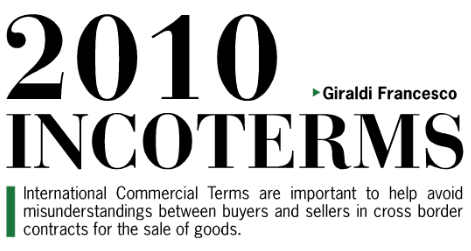 I just read the latest issue of the CHaINA magazine (edited by the Supply Chain Council) and I found a very nice explanation of the changes from Incoterms 2000 to Incoterms 2010.
I just read the latest issue of the CHaINA magazine (edited by the Supply Chain Council) and I found a very nice explanation of the changes from Incoterms 2000 to Incoterms 2010.
To sum it up grossly:
- Two changes for the FOB incoterm: the seller’s reponsibility extends until the goods are “on board the vessel” rather than “past the ship rail” (a small technical difference), and the seller must package the goods rather than provide the packaging (it’s nice to get this clarified, even though in practice it was usually already the case).
- Under CIF, the seller is required to pay for more insurance than previously.
- The DEQ incoterm is replaced by DAT (with a slightly different meaning).
- The DAF, DES, and DDU incoterms are replaced by DAP.
- If you need to receive hard copies (as opposed to electronic versions) of your shipping documents, make this point clear in your contract.
And don’t forget, you can still write “FOB Incoterms 2000” on your purchase orders and in your letters of credit.
For more information about incoterms 2010: see this wall chart, or go and purchase the document at the source (on the ICC website).

Thank you
Hi!, what do you mean we can still use FOB Incoterms 2000? does it mean although we wrote Incoterms 2000, we are actually following Incoterms 2010??
Clara,
From my understanding, it is not compulsory to follow the latest incoterms. All you need is a clear term to follow. “FOB, according to Incoterms 2000” is clear, and you can still use it if you feel more comfortable with it.
الموضوع التغييرات من إنكوترمز 2000 إلى 2010 إنكوترمز
يقدم للجامعة
I can’t understand arabic so I can’t respond, sorry…
thanks for your help